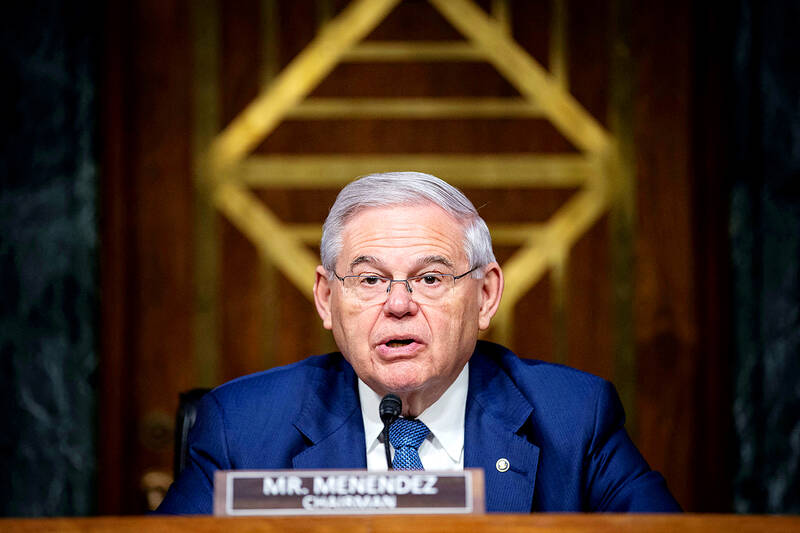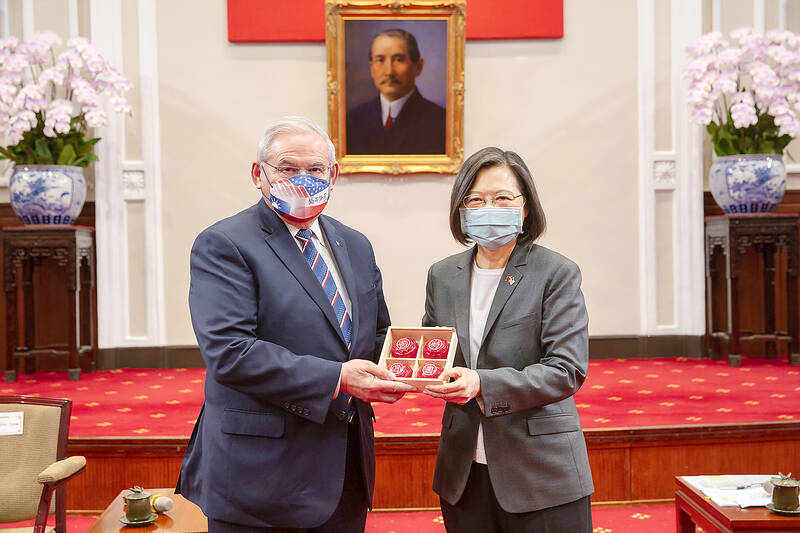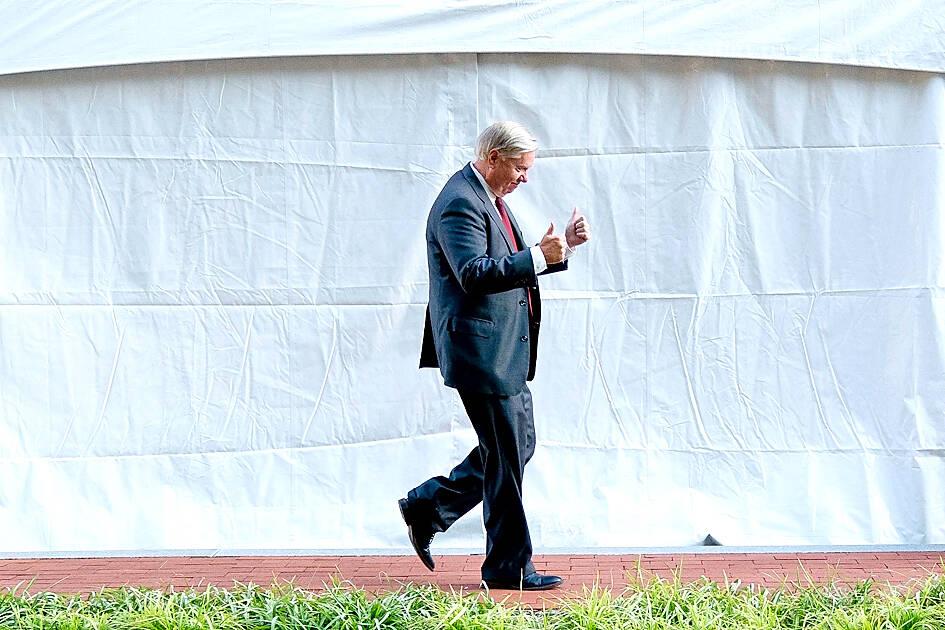A bill described by its sponsors as “the most comprehensive restructuring of US policy toward Taiwan since the Taiwan Relations Act of 1979,” was expected to receive bipartisan support at a committee hearing yesterday, one of its initiators said on Tuesday.
“I think we will have a strong bipartisan vote tomorrow that we’re working on,” US Senator Bob Menendez said a day before the US Senate Foreign Relations Committee, which Menendez chairs, was to mark up the draft Taiwan policy act (TPA).
The legislation includes clauses calling for an “enhanced defense partnership” between Taiwan and the US, under which Washington would provide Taipei with US$4.5 billion in foreign military financing.

Photo: Reuters
It also comes with symbolic gestures, including the renaming of Taiwan’s de facto embassy in Washington from the Taipei Economic and Cultural Representative Office to the “Taiwan Representative Office.”
Another provision would designate Taiwan as a “major non-NATO ally” for the purposes of expediting arms sales. The status is currently afforded to Australia, Israel, Japan, South Korea and others.
The bill has raised concerns in the White House.

Photo: Taiwan Presidential Office via AP
US National Security Adviser Jake Sullivan told Bloomberg last week that he would meet with congressional leaders to discuss the TPA, initiated by Menendez and US Senator Lindsey Graham.
“There are elements of that legislation, with respect to how we can strengthen our security assistance for Taiwan, that are quite effective and robust; that will improve Taiwan’s security,” Sullivan told Bloomberg’s David Rubenstein on Wednesday last week. “There are other elements that give us some concern.”
Bloomberg reported that Sullivan declined to go into detail, but it said that the US government was trying to strike a balance between supporting Taiwan while tamping down growing bipartisan hawkishness on Capitol Hill against China.

Photo: AFP
China’s Taiwan Affairs Office spokeswoman Zhu Fenglian (朱鳳蓮) yesterday said that China resolutely opposes the TPA, which “seriously violates” basic principles of international relations, the “one China” principle, and the Three Joint Communiques between the US and China.
Asked about yesterday’s committee session, Menendez told reporters in Washington on Tuesday that he and other senators did have “various conversations with the administration” over the proposed bill.
“We think we are landing in a good spot that can meet some of their concerns and at the same time have a very strong bill, and expresses the Senate’s intent of strengthening our relationship with Taiwan, of assisting Taiwan in its abilities to preserve its territorial integrity,” he said.
He said that the bill would not change the US’ policy toward Taiwan, but it would give “greater clarity about our willingness to help Taiwan.”
Asked if there were to be changes to the wording of the bill in the committee session, the senator said there would be “some edits to it, there will be some changes” as there normally are in any legislative process.
The support for Taiwan is important, Menendez said, citing the example of Lithuania, which has faced Chinese economic sanctions for months after allowing Taiwan to open a representative office in Vilnius last year.
“This is a test for the West. If we cannot help a country like Lithuania meet the challenge of China for deciding its own sovereign decisions, then we will lose this battle,” he said.

INVESTIGATION: The case is the latest instance of a DPP figure being implicated in an espionage network accused of allegedly leaking information to Chinese intelligence Democratic Progressive Party (DPP) member Ho Jen-chieh (何仁傑) was detained and held incommunicado yesterday on suspicion of spying for China during his tenure as assistant to then-minister of foreign affairs Joseph Wu (吳釗燮). The Taipei District Prosecutors’ Office said Ho was implicated during its investigation into alleged spying activities by former Presidential Office consultant Wu Shang-yu (吳尚雨). Prosecutors said there is reason to believe Ho breached the National Security Act (國家安全法) by leaking classified Ministry of Foreign Affairs information to Chinese intelligence. Following interrogation, prosecutors petitioned the Taipei District Court to detain Ho, citing concerns over potential collusion or tampering of evidence. The

Seventy percent of middle and elementary schools now conduct English classes entirely in English, the Ministry of Education said, as it encourages schools nationwide to adopt this practice Minister of Education (MOE) Cheng Ying-yao (鄭英耀) is scheduled to present a report on the government’s bilingual education policy to the Legislative Yuan’s Education and Culture Committee today. The report would outline strategies aimed at expanding access to education, reducing regional disparities and improving talent cultivation. Implementation of bilingual education policies has varied across local governments, occasionally drawing public criticism. For example, some schools have required teachers of non-English subjects to pass English proficiency

‘FORM OF PROTEST’: The German Institute Taipei said it was ‘shocked’ to see Nazi symbolism used in connection with political aims as it condemned the incident Sung Chien-liang (宋建樑), who led efforts to recall Democratic Progressive Party (DPP) Legislator Lee Kun-cheng (李坤城), was released on bail of NT$80,000 yesterday amid an outcry over a Nazi armband he wore to questioning the night before. Sung arrived at the New Taipei City District Prosecutors’ Office for questioning in a recall petition forgery case on Tuesday night wearing a red armband bearing a swastika, carrying a copy of Adolf Hitler’s Mein Kampf and giving a Nazi salute. Sung left the building at 1:15am without the armband and apparently covering the book with a coat. This is a serious international scandal and Chinese

TRADE: The premier pledged safeguards on ‘Made in Taiwan’ labeling, anti-dumping measures and stricter export controls to strengthen its position in trade talks Products labeled “made in Taiwan” must be genuinely made in Taiwan, Premier Cho Jung-tai (卓榮泰) said yesterday, vowing to enforce strict safeguards against “origin laundering” and initiate anti-dumping investigations to prevent China dumping its products in Taiwan. Cho made the remarks in a discussion session with representatives from industries in Kaohsiung. In response to the US government’s recent announcement of “reciprocal” tariffs on its trading partners, President William Lai (賴清德) and Cho last week began a series of consultations with industry leaders nationwide to gather feedback and address concerns. Taiwanese and US officials held a videoconference on Friday evening to discuss the